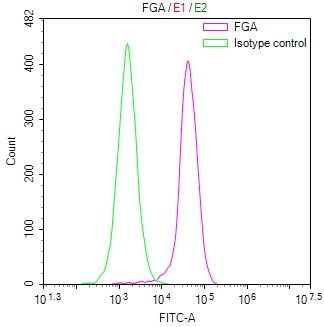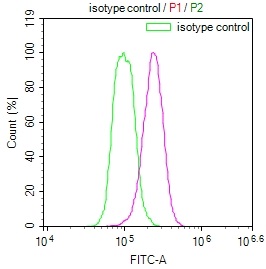FGA Recombinant Monoclonal Antibody
-
中文名稱:FGA Recombinant Monoclonal Antibody
-
貨號(hào):CSB-RA928446A0HU
-
規(guī)格:¥1320
-
圖片:
-
Overlay Peak curve showing HepG2 cells stained with CSB-RA928446A0HU (red line) at 1:100. The cells were fixed in 4% formaldehyde and permeated by 0.2% TritonX-100 for?10min. Then 10% normal goat serum to block non-specific protein-protein interactions followed by the antibody (1ug/1*106cells) for 45min at 4℃. The secondary antibody used was FITC-conjugated goat anti-rabbit IgG (H+L) at 1/200 dilution for 35min at 4℃.Control antibody (green line) was Rabbit IgG (1ug/1*106cells) used under the same conditions. Acquisition of >10,000 events was performed.
-
-
其他:
產(chǎn)品詳情
-
Uniprot No.:
-
基因名:
-
別名:Fibrinogen alpha chain [Cleaved into: Fibrinopeptide A; Fibrinogen alpha chain], FGA
-
反應(yīng)種屬:Human
-
免疫原:A synthesized peptide derived from human FGA
-
免疫原種屬:Homo sapiens (Human)
-
標(biāo)記方式:Non-conjugated
-
克隆類型:Monoclonal
-
抗體亞型:Rabbit IgG
-
純化方式:Affinity-chromatography
-
克隆號(hào):5D7
-
濃度:It differs from different batches. Please contact us to confirm it.
-
保存緩沖液:Rabbit IgG in phosphate buffered saline, pH 7.4, 150mM NaCl, 0.02% sodium azide and 50% glycerol.
-
產(chǎn)品提供形式:Liquid
-
應(yīng)用范圍:ELISA, FC
-
推薦稀釋比:
Application Recommended Dilution FC 1:50-1:200 -
Protocols:
-
儲(chǔ)存條件:Upon receipt, store at -20°C or -80°C. Avoid repeated freeze.
-
貨期:Basically, we can dispatch the products out in 1-3 working days after receiving your orders. Delivery time maybe differs from different purchasing way or location, please kindly consult your local distributors for specific delivery time.
-
用途:For Research Use Only. Not for use in diagnostic or therapeutic procedures.
相關(guān)產(chǎn)品
靶點(diǎn)詳情
-
功能:Cleaved by the protease thrombin to yield monomers which, together with fibrinogen beta (FGB) and fibrinogen gamma (FGG), polymerize to form an insoluble fibrin matrix. Fibrin has a major function in hemostasis as one of the primary components of blood clots. In addition, functions during the early stages of wound repair to stabilize the lesion and guide cell migration during re-epithelialization. Was originally thought to be essential for platelet aggregation, based on in vitro studies using anticoagulated blood. However, subsequent studies have shown that it is not absolutely required for thrombus formation in vivo. Enhances expression of SELP in activated platelets via an ITGB3-dependent pathway. Maternal fibrinogen is essential for successful pregnancy. Fibrin deposition is also associated with infection, where it protects against IFNG-mediated hemorrhage. May also facilitate the immune response via both innate and T-cell mediated pathways.
-
基因功能參考文獻(xiàn):
- this study shows that hypofibrinogenaemia associated with novel Aalpha126Val-->Asp mutation in the fibrinogen coiled coil PMID: 28816342
- All the exons and exon-intron boundaries of fibrinogen genes (FGA, FGB and FGG) were analysed by direct DNA sequencing PMID: 29748775
- Taken together, an increased pretreatment plasma fibrinogen level was related to worse survival in digestive system tumors, indicating that it could be a useful prognostic marker in these types of tumors. PMID: 29874984
- The risk of early pregnancy loss was significantly higher in women with homozygous or heterozygous FGA: p.Thr331Ala polymorphism than in women with FGA: p.Thr331 (Odds ratio: 8.84, P < .05). PMID: 27099386
- Data defined the mutational burden of the fibrinogen FGA, FGB, and FGG genes, and estimated the prevalence of inherited fibrinogen disorders through a systematic analysis of exome/genome data. PMID: 29240685
- CD47 expression is decreased on the surface of erythrocytes in obese subjects. These changes in CD47 expression on the erythrocytes surface may be an adaptive response to hyperfibrinogenemia associated with obesity. PMID: 25914268
- Fibrinogen A alpha arginine-glycine-aspartate sequence (residues 95-97) is essential for binding to its erythrocyte receptor. PMID: 29662311
- Binding of human fibrinogen to MRP enhances Streptococcus suis survival in host blood in a alphaXbeta2 integrin-dependent manner. PMID: 27231021
- High fibrinogen level is associated with Type-2 diabetes and diabetic vascular disease. PMID: 28119309
- The heterozygous AalphaArg16His and gammaAsp185Asn identified in the study probably underlie the dysfibrinogenemia in this pedigree, with the latter being identified for the first time. PMID: 28425010
- Preoperative fibrinogen levels appeared as an independent mortality risk factor in non-metastatic colorectal cancer patients with normal GPS scores PMID: 28269756
- evidence that VLITL confers amyloidogenic properties to Aalpha-chain frameshift variants, yielding a previously unknown molecular basis for the pathogenesis of Aalpha-chain amyloidosis PMID: 29089309
- We used mass spectrometry of plasma from trauma patients to find that fibrinogen Aalpha-C domain methionine sulfoxide content was selectively-increased in patients with coagulopathy vs. those without coagulopathy. This evidence supports a novel linkage between oxidative stress, coagulopathy, and bleeding after injury PMID: 27105953
- Using a quantum chemical approach method, it has been established that mutations in MMP-10 and FGA proteins led to substantial energetic modifications suggesting an impact on their functions and/or stability in the recurrent pregnancy loss patients. PMID: 29016666
- Data indicate that repeated measurement after five hours showed a statistical significant difference for the fractional synthesis rate of fibrinogen but not for albumin. PMID: 28350862
- Data indicate only the highest concentration of apixaban was capable to significantly reduce thrombus formation, fibrin association and platelet-aggregate formation. PMID: 28192448
- Fibrinogen A alpha-chain amyloidosis appears to be an under-recognized disorder in Braga, Portugal, where we found a high frequency of the FGA p.Glu545Val variant PMID: 28359658
- High fibrinogen expression is associated with pancreatic carcinoma. PMID: 28219450
- The high preoperative peripheral serum fibrinogen level was related to poor survival in penile cancer patients, suggeting fibrinogen may serve as a powerful predictor of cancer specific survival (CSS) in penile cancer patients. PMID: 27738342
- Q237 is rapidly crosslinked first by FXIIIa followed by Q366 and Q328. Both (15)NH4Cl and (15)N-GEE could be crosslinked to the three glutamines in alphaC (233-425) with a similar order of reactivity. No glutamine is dependent on another to react first. Moreover, the remaining two glutamines of each mutant were both still reactive. These glutamines play distinct roles in fibrin crosslinking and clot architecture. PMID: 26951791
- The molecular characterization of two novel afibrinogenemic mutations in the fibrinogen A alpha and fibrinogen B beta chain establishes the importance of the A alpha and B beta C-terminal region for normal fibrinogen assembly and secretion. PMID: 27164460
- This meta-analysis results did not show significant associations between the polymorphisms in FGA and Ischemic stroke. PMID: 27266621
- there was a relatively high frequency of pregnancy loss in the setting of the FGA Thr312Ala polymorphism. PMID: 26139837
- Fibrinogen was significantly increased in pediatric patients with complicated appendicitis compared to patients with uncomplicated appendicitis or non-specific abdominal pain. PMID: 27760719
- No association between three single nucleotide polymorphisms in the fibrinogen alpha gene and schizophrenia. PMID: 28203040
- Fibrinogen Shanghai results in N-terminal truncation of Aalpha chain, which does not interfere with synthesis, assembly or secretion of fibrinogen, but compromises fibrin polymerization and clot formation. PMID: 27555433
- We found a mutation that consists of a R458C substitution on the fibrinogen alpha chain gene confirmed in 13 new familial subjects that causes a rare subtype of dysfibrinogenemia characterized by venous thromboembolic events PMID: 26581183
- Fibrinogen Nijmegen, a mutation at the same position, is causative for thrombosis, whereas fibrinogen Innsbruck appears to lead to a bleeding tendency, illustrating that even mutations at the same position can cause contrary symptoms. PMID: 26540126
- Neutrophilic asthma patients and eosinophilic asthma patients had increased fibrinogen compared to controls. PMID: 27044366
- To novel fibrinogen mutations have been identified (Aa17GlyalphaCys and Aa381SeralphaPhe) that cosegregate with dysfibrinogenemia in seven family members of a Chinese pedigree. PMID: 26083984
- The study reports two novel mutations detected in the FGA and FGB genes in two patients with inherited hypofibrinogenemia. PMID: 25981141
- Nutrient overload-induced up-regulation of all three fibrinogen component subunits of the coagulation cascade provides a possible mechanism to explain the excess cardiovascular disease mortality observed in non-alcoholic fatty liver disease patients. PMID: 26256740
- No association between cognition and gene polymorphisms involved in thrombosis and haemostasis PMID: 26228839
- An analysis of the results obtained in this study and a critical review of previously published data indicate that gene polymorphisms in FGA and FGB are not related to ischemic stroke in children PMID: 25555432
- Results support the idea that fibrinogen alphaC regions are involved in the thickening of fibrin fibers. PMID: 25393591
- The study identified a 5.9 kDa C-terminal fragment of the fibrinogen alpha chain as an early serum biomarker of fibrogenic processes in patients with liver disease. PMID: 25275549
- The Aalpha-Val360 related cross-sectionally to physiologic, radiologic, and symptomatic markers of disease severity of PiZZ alpha1-antitrypsin deficiency. PMID: 25569856
- Case Report: hepatocytes homozygous for a large FGA deletion can be genetically modified to restore Aalpha-chain protein expression and secrete a functional fibrinogen hexamer. PMID: 25163824
- High plasma D-dimer, fibrinogen, and platelet levels are associated with epithelial ovarian cancer independently of venous thromboembolism. PMID: 25347092
- Elevated pre-operative plasma fibrinogen level is associated with aggressive soft-tissue sarcoma. PMID: 24122271
- Results show that oxidized fibrinogen, instead of serum albumin (HSA), is the key protein for intermolecular dityrosine formation in plasma. PMID: 25280629
- Plasma fibrinogen is an independent predictor for the severity of coronary artery disease in diabetic patients. PMID: 24803720
- findings indicate that FGA and SLC6A4 gene interactions may contribute to the phenotypes of ASD rather than the incidence of ASD. PMID: 24192574
- role in regulation of clot formation and fibrinolysis PMID: 24048413
- Both crude and multivariable regression analyses show that the FGA Thr312Ala polymorphism is a protective factor in the Polish population under dominant and additive models of inheritance. PMID: 24821635
- Data indicate that ibrinogen binding to Staphylococcus aureus fibronectin-binding protein A (FnBPA) is sterically regulated by fibronectin binding. PMID: 24627488
- Stepwise assembly of fibrinogen is assisted by the endoplasmic reticulum ERp57 lectin-chaperone system in a human hepatocyte cell line. PMID: 24040290
- Studies indicate that in afibrinogenemia and hypofibrinogenemia, most mutations of the FGA, FGB, or FGG fibrinogen encoding genes are null mutations. PMID: 23852822
- Elevated plasma fibrinogen levels are associated with nonmetastatic colon cancer. PMID: 23612884
- These results indicate that DPT can modify certain biological functions of fibrin, and thus a another function of this extracellular matrix protein was revealed. PMID: 23877568
顯示更多
收起更多
-
相關(guān)疾病:Congenital afibrinogenemia (CAFBN); Amyloidosis 8 (AMYL8); Dysfibrinogenemia, congenital (DYSFIBRIN)
-
亞細(xì)胞定位:Secreted.
-
組織特異性:Detected in blood plasma (at protein level).
-
數(shù)據(jù)庫鏈接:
Most popular with customers
-
-
YWHAB Recombinant Monoclonal Antibody
Applications: ELISA, WB, IHC, IF, FC
Species Reactivity: Human, Mouse, Rat
-
Phospho-YAP1 (S127) Recombinant Monoclonal Antibody
Applications: ELISA, WB, IHC
Species Reactivity: Human
-
-
-
-
-




















